Attached files
| file | filename |
|---|---|
| 8-K - FORM 8-K - JPMORGAN CHASE & CO | y87160e8vk.htm |
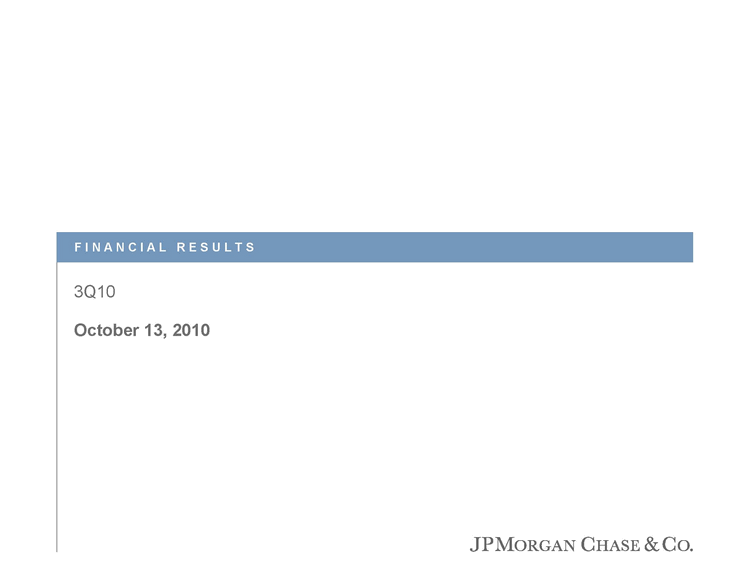
| FINANCIAL RESULTS 3Q10 October 13, 2010 |
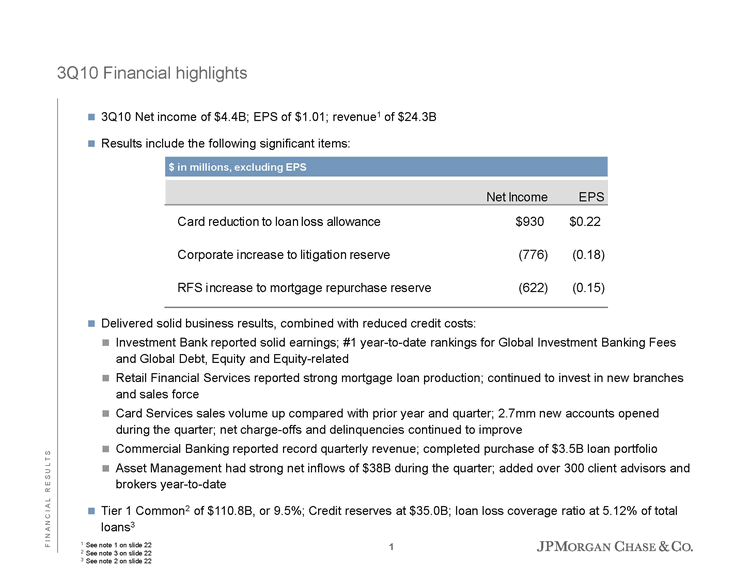
| 3Q10 Financial highlights R E S U L T S F I N A N C I A L 3Q10 Net income of $4.4B; EPS of $1.01; revenue1 of $24.3B Results include the following significant items: $ in millions, excluding EPS Net Income EPS Card reduction to loan loss allowance $930 $0.22 Corporate increase to litigation reserve (776) (0.18) RFS increase to mortgage repurchase reserve (622) (0.15) Delivered solid business results, combined with reduced credit costs: Investment Bank reported solid earnings; #1 year-to-date rankings for Global Investment Banking Fees and Global Debt, Equity and Equity-related Retail Financial Services reported strong mortgage loan production; continued to invest in new branches and sales force Card Services sales volume up compared with prior year and quarter; 2.7mm new accounts opened during the quarter; net charge-offs and delinquencies continued to improve Commercial Banking reported record quarterly revenue; completed purchase of $3.5B loan portfolio Asset Management had strong net inflows of $38B during the quarter; added over 300 client advisors and brokers year-to-date Tier 1 Common2 of $110.8B, or 9.5%; Credit reserves at $35.0B; loan loss coverage ratio at 5.12% of total loans3 1 See note 1 on slide 22 1 2 See note 3 on slide 22 3 See note 2 on slide 22 |
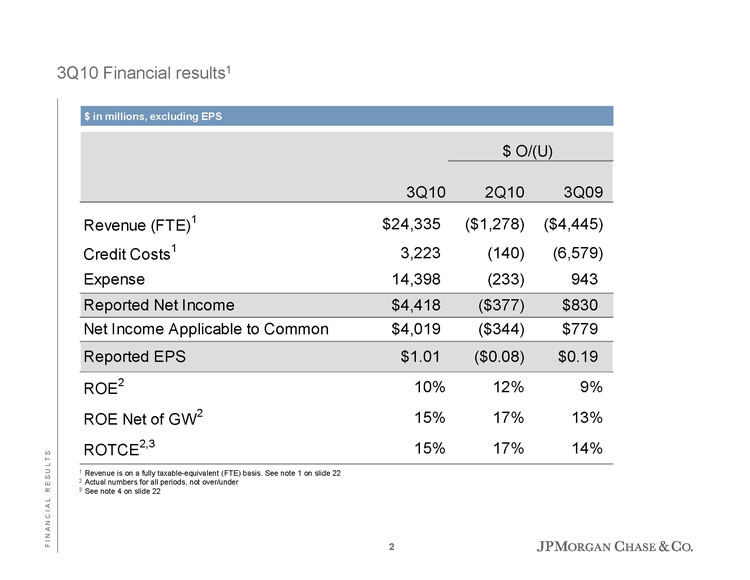
| 3Q10 Financial results1 R E S U L T S $ in millions, excluding EPS $ O/(U) 3Q10 2Q10 3Q09 1 $24,335 ($1,278) ($4,445) Revenue (FTE) 1 3,223 (140) (6,579) Credit Costs Expense 14,398 (233) 943 Reported Net Income $4,418 ($377) $830 Net Income Applicable to Common $4,019 ($344) $779 Reported EPS $1.01 ($0.08) $0.19 2 10% 12% 9% ROE 2 15% 17% 13% ROE Net of GW 2,3 15% 17% 14% ROTCE 1 Revenue is on a fully taxable-equivalent (FTE) basis. See note 1 on slide 22 2 Actual numbers for all periods, not over/under 3 See note 4 on slide 22 F I N A N C I A L 2 |
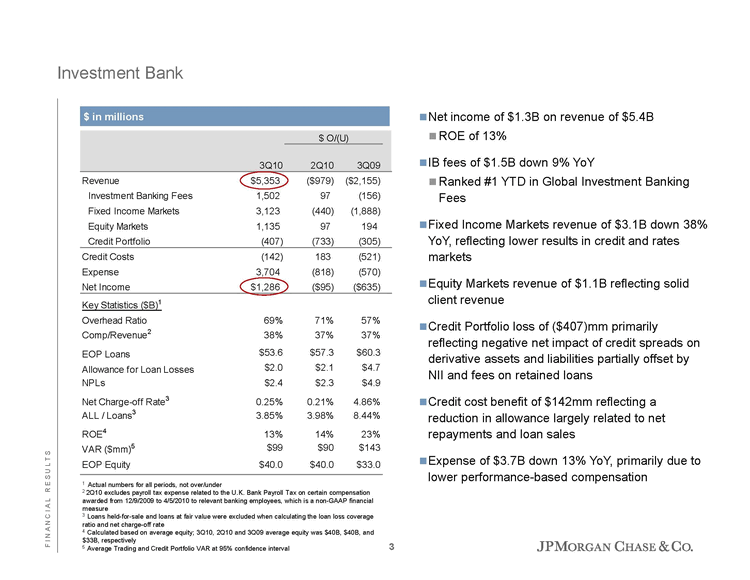
| Investment Bank $ in millions $ O/(U) 3Q10 2Q10 3Q09 Revenue $5,353 ($979) ($2,155) Investment Banking Fees 1,502 97 (156) Fixed Income Markets 3,123 (440) (1,888) Equity Markets 1,135 97 194 Credit Portfolio (407) (733) (305) Credit Costs (142) 183 (521) Expense 3,704 (818) (570) Net Income $1,286 ($95) ($635) Key Statistics ($B)1 Overhead Ratio 69% 71% 57% Comp/Revenue2 38% 37% 37% EOP Loans $53.6 $57.3 $60.3 Allowance for Loan Losses $2.0 $2.1 $4.7 NPLs $2.4 $2.3 $4.9 Net Charge-off Rate3 0.25% 0.21% 4.86% ALL / Loans3 3.85% 3.98% 8.44% ROE4 13% 14% 23% 5 $99 $90 $143 S VAR ($mm) T EOP Equity $40.0 $40.0 $33.0 L U S E 1 Actual numbers for all periods, not over/under R 2 2Q10 excludes payroll tax expense related to the U.K. Bank Payroll Tax on certain compensation L awarded from 12/9/2009 to 4/5/2010 to relevant banking employees, which is a non-GAAP financial A measure I C 3 Loans held-for-sale and loans at fair value were excluded when calculating the loan loss coverage N ratio and net charge-off rate A 4 Calculated based on average equity; 3Q10, 2Q10 and 3Q09 average equity was $40B, $40B, and N $33B, respectively I 3 F 5 Average Trading and Credit Portfolio VAR at 95% confidence interval Net income of $1.3B on revenue of $5.4B ROE of 13% IB fees of $1.5B down 9% YoY Ranked #1 YTD in Global Investment Banking Fees Fixed Income Markets revenue of $3.1B down 38% YoY, reflecting lower results in credit and rates markets Equity Markets revenue of $1.1B reflecting solid client revenue Credit Portfolio loss of ($407)mm primarily reflecting negative net impact of credit spreads on derivative assets and liabilities partially offset by NII and fees on retained loans Credit cost benefit of $142mm reflecting a reduction in allowance largely related to net repayments and loan sales Expense of $3.7B down 13% YoY, primarily due to lower performance-based compensation |
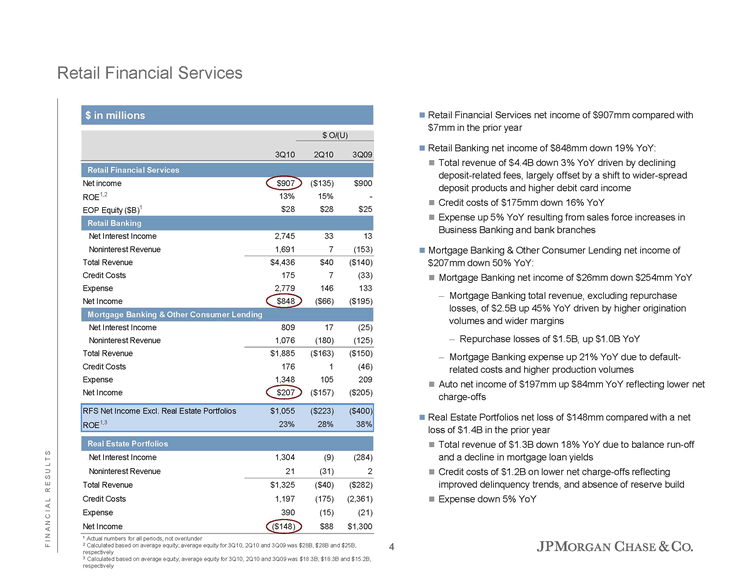
| Retail Financial Services $ in millions $ O/(U) 3Q10 2Q10 3Q09 Retail Financial Services Net income $907 ($135) $900 ROE1,2 13% 15% - EOP Equity ($B)1 $28 $28 $25 Retail Banking Net Interest Income 2,745 33 13 Noninterest Revenue 1,691 7 (153) Total Revenue $4,436 $40 ($140) Credit Costs 175 7 (33) Expense 2,779 146 133 Net Income $848 ($66) ($195) Mortgage Banking & Other Consumer Lending Net Interest Income 809 17 (25) Noninterest Revenue 1,076 (180) (125) Total Revenue $1,885 ($163) ($150) Credit Costs 176 1 (46) Expense 1,348 105 209 Net Income $207 ($157) ($205) RFS Net Income Excl. Real Estate Portfolios $1,055 ($223) ($400) ROE1,3 23% 28% 38% Real Estate Portfolios S Net Interest Income 1,304 (9) (284) T L Noninterest Revenue 21 (31) 2 U S E Total Revenue $1,325 ($40) ($282) R L Credit Costs 1,197 (175) (2,361) A Expense 390 (15) (21) I C N Net Income ($148) $88 $1,300 A N 1 Actual numbers for all periods, not over/under I 4 F 2 Calculated based on average equity; average equity for 3Q10, 2Q10 and 3Q09 was $28B, $28B and $25B, respectively 3 Calculated based on average equity; average equity for 3Q10, 2Q10 and 3Q09 was $18.3B, $18.3B and $15.2B, respectively Retail Financial Services net income of $907mm compared with $7mm in the prior year Retail Banking net income of $848mm down 19% YoY: Total revenue of $4.4B down 3% YoY driven by declining deposit-related fees, largely offset by a shift to wider-spread deposit products and higher debit card income Credit costs of $175mm down 16% YoY Expense up 5% YoY resulting from sales force increases in Business Banking and bank branches Mortgage Banking & Other Consumer Lending net income of $207mm down 50% YoY: Mortgage Banking net income of $26mm down $254mm YoY — Mortgage Banking total revenue, excluding repurchase losses, of $2.5B up 45% YoY driven by higher origination volumes and wider margins — Repurchase losses of $1.5B, up $1.0B YoY — Mortgage Banking expense up 21% YoY due to default-related costs and higher production volumes Auto net income of $197mm up $84mm YoY reflecting lower net charge-offs Real Estate Portfolios net loss of $148mm compared with a net loss of $1.4B in the prior year Total revenue of $1.3B down 18% YoY due to balance run-off and a decline in mortgage loan yields Credit costs of $1.2B on lower net charge-offs reflecting improved delinquency trends, and absence of reserve build Expense down 5% YoY |
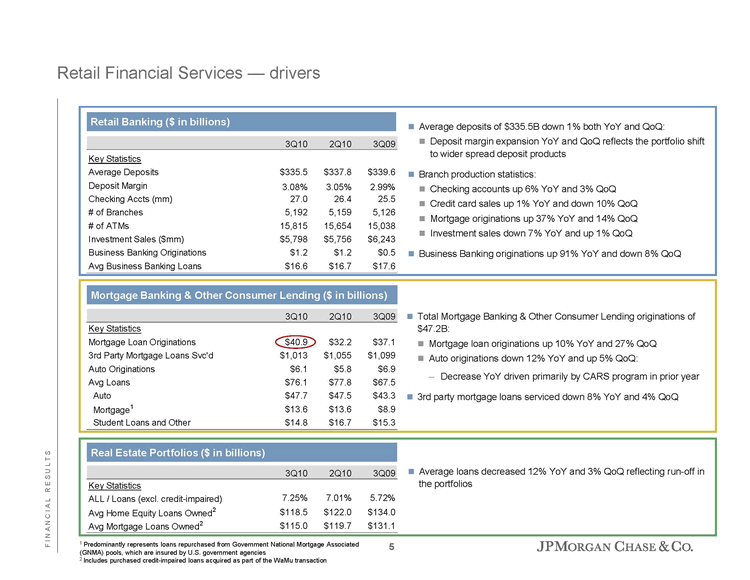
| Retail Financial Services — drivers R E S U L T S F I N A N C I A L Retail Banking ($ in billions) 3Q10 2Q10 3Q09 Key Statistics Average Deposits $335.5 $337.8 $339.6 Deposit Margin 3.08% 3.05% 2.99% Checking Accts (mm) 27.0 26.4 25.5 # of Branches 5,192 5,159 5,126 # of ATMs 15,815 15,654 15,038 Investment Sales ($mm) $5,798 $5,756 $6,243 Business Banking Originations $1.2 $1.2 $0.5 Avg Business Banking Loans $16.6 $16.7 $17.6 Mortgage Banking & Other Consumer Lending ($ in billions) 3Q10 2Q10 3Q09 Key Statistics Mortgage Loan Originations $40.9 $32.2 $37.1 3rd Party Mortgage Loans Svc’d $1,013 $1,055 $1,099 Auto Originations $6.1 $5.8 $6.9 Avg Loans $76.1 $77.8 $67.5 Auto $47.7 $47.5 $43.3 Mortgage1 $13.6 $13.6 $8.9 Student Loans and Other $14.8 $16.7 $15.3 Real Estate Portfolios ($ in billions) 3Q10 2Q10 3Q09 Key Statistics ALL / Loans (excl. credit-impaired) 7.25% 7.01% 5.72% Avg Home Equity Loans Owned2 $118.5 $122.0 $134.0 Avg Mortgage Loans Owned2 $115.0 $119.7 $131.1 1 Predominantly represents loans repurchased from Government National Mortgage Associated 5 (GNMA) pools, which are insured by U.S. government agencies 2 Includes purchased credit-impaired loans acquired as part of the WaMu transaction Average deposits of $335.5B down 1% both YoY and QoQ: Deposit margin expansion YoY and QoQ reflects the portfolio shift to wider spread deposit products Branch production statistics: Checking accounts up 6% YoY and 3% QoQ Credit card sales up 1% YoY and down 10% QoQ Mortgage originations up 37% YoY and 14% QoQ Investment sales down 7% YoY and up 1% QoQ Business Banking originations up 91% YoY and down 8% QoQ Total Mortgage Banking & Other Consumer Lending originations of $47.2B: Mortgage loan originations up 10% YoY and 27% QoQ Auto originations down 12% YoY and up 5% QoQ: — Decrease YoY driven primarily by CARS program in prior year 3rd party mortgage loans serviced down 8% YoY and 4% QoQ Average loans decreased 12% YoY and 3% QoQ reflecting run-off in the portfolios |
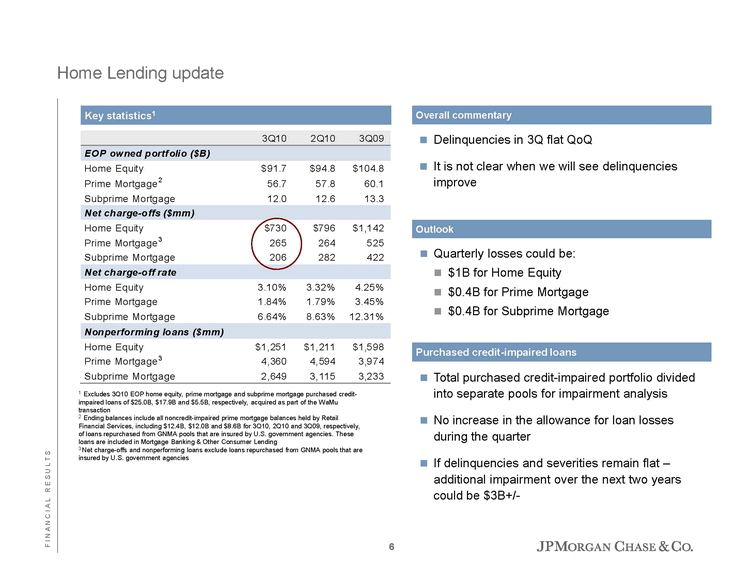
| Home Lending update R E S U L T S I N A N C I A L Key statistics1 3Q10 2Q10 3Q09 EOP owned portf olio ($B) Home Equity $91.7 $94.8 $104.8 Prime Mortgage2 56.7 57.8 60.1 Subprime Mortgage 12.0 12.6 13.3 Net charge-offs ($mm) Home Equity $730 $796 $1,142 Prime Mortgage3 265 264 525 Subprime Mortgage 206 282 422 Net charge-off rate Home Equity 3.10% 3.32% 4.25% Prime Mortgage 1.84% 1.79% 3.45% Subprime Mortgage 6.64% 8.63% 12.31% Nonperforming loans ($mm) Home Equity $1,251 $1,211 $1,598 Prime Mortgage3 4,360 4,594 3,974 Subprime Mortgage 2,649 3,115 3,233 1 Excludes 3Q10 EOP home equity, prime mortgage and subprime mortgage purchased credit-impaired loans of $25.0B, $17.9B and $5.5B, respectively, acquired as part of the WaMu transaction 2 Ending balances include all noncredit-impaired prime mortgage balances held by Retail Financial Services, including $12.4B, $12.0B and $8.6B for 3Q10, 2Q10 and 3Q09, respectively, of loans repurchased from GNMA pools that are insured by U.S. government agencies. These loans are included in Mortgage Banking & Other Consumer Lending 3 Net charge-offs and nonperforming loans exclude loans repurchased from GNMA pools that are insured by U.S. government agencies Overall commentary Delinquencies in 3Q flat QoQ It is not clear when we will see delinquencies improve Outlook Quarterly losses could be: $1B for Home Equity $0.4B for Prime Mortgage $0.4B for Subprime Mortgage Purchased credit-impaired loans Total purchased credit-impaired portfolio divided into separate pools for impairment analysis No increase in the allowance for loan losses during the quarter If delinquencies and severities remain flat — additional impairment over the next two years could be $3B+/- F 6 |
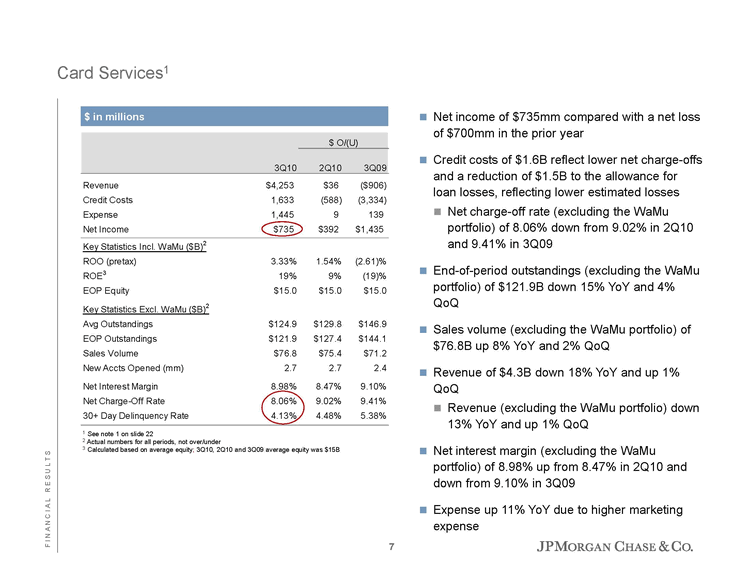
| Card Services1 $ in millions $ O/(U) 3Q10 2Q10 3Q09 Revenue $4,253 $36 ($906) Credit Costs 1,633 (588) (3,334) Expense 1,445 9 139 Net Income $735 $392 $1,435 Key Statistics Incl. WaMu ($B)2 ROO (pretax) 3.33% 1.54% (2.61)% ROE3 19% 9% (19)% EOP Equity $15.0 $15.0 $15.0 Key Statistics Excl. WaMu ($B)2 Avg Outstandings $124.9 $129.8 $146.9 EOP Outstandings $121.9 $127.4 $144.1 Sales Volume $76.8 $75.4 $71.2 New Accts Opened (mm) 2.7 2.7 2.4 Net Interest Margin 8.98% 8.47% 9.10% Net Charge-Off Rate 8.06% 9.02% 9.41% 30+ Day Delinquency Rate 4.13% 4.48% 5.38% 1 See note 1 on slide 22 2 Actual numbers for all periods, not over/under 3 Calculated based on average equity; 3Q10, 2Q10 and 3Q09 average equity was $15B S T I 7 F Net income of $735mm compared with a net loss of $700mm in the prior year Credit costs of $1.6B reflect lower net charge-offs and a reduction of $1.5B to the allowance for loan losses, reflecting lower estimated losses Net charge-off rate (excluding the WaMu portfolio) of 8.06% down from 9.02% in 2Q10 and 9.41% in 3Q09 End-of-period outstandings (excluding the WaMu portfolio) of $121.9B down 15% YoY and 4% QoQ Sales volume (excluding the WaMu portfolio) of $76.8B up 8% YoY and 2% QoQ Revenue of $4.3B down 18% YoY and up 1% QoQ Revenue (excluding the WaMu portfolio) down 13% YoY and up 1% QoQ Net interest margin (excluding the WaMu portfolio) of 8.98% up from 8.47% in 2Q10 and down from 9.10% in 3Q09 Expense up 11% YoY due to higher marketing expense |
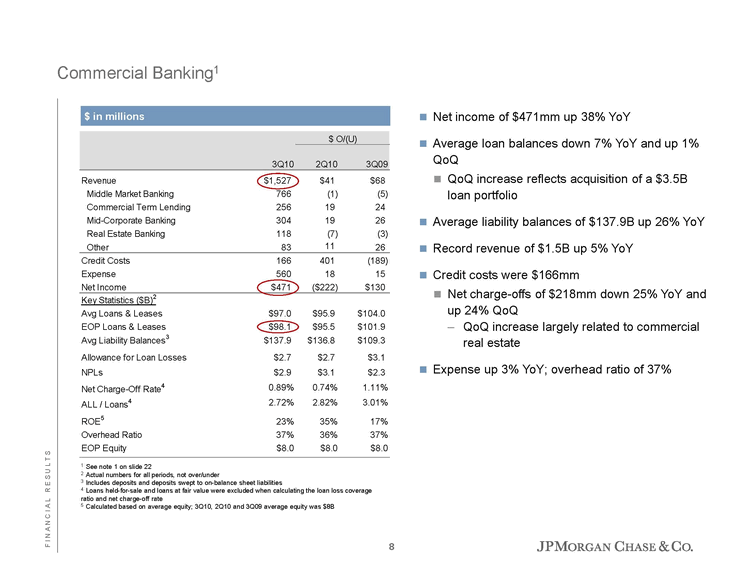
| Commercial Banking1 $ in millions $ O/(U) 3Q10 2Q10 3Q09 Revenue $1,527 $41 $68 Middle Market Banking 766 (1) (5) Commercial Term Lending 256 19 24 Mid-Corporate Banking 304 19 26 Real Estate Banking 118 (7) (3) Other 83 11 26 Credit Costs 166 401 (189) Expense 560 18 15 Net Income $471 ($222) $130 Key Statistics ($B)2 Avg Loans & Leases $97.0 $95.9 $104.0 EOP Loans & Leases $98.1 $95.5 $101.9 Avg Liability Balances3 $137.9 $136.8 $109.3 Allowance for Loan Losses $2.7 $2.7 $3.1 NPLs $2.9 $3.1 $2.3 4 0.89% 0.74% 1.11% Net Charge-Off Rate 4 2.72% 2.82% 3.01% ALL / Loans ROE5 23% 35% 17% Overhead Ratio 37% 36% 37% S EOP Equity $8.0 $8.0 $8.0 T L 1 See note 1 on slide 22 U 2 Actual numbers for all periods, not over/under S E 3 Includes deposits and deposits swept to on-balance sheet liabilities R 4 Loans held-for-sale and loans at fair value were excluded when calculating the loan loss coverage L ratio and net charge-off rate A 5 Calculated based on average equity; 3Q10, 2Q10 and 3Q09 average equity was $8B I C N A N I 8 F Net income of $471mm up 38% YoY Average loan balances down 7% YoY and up 1% QoQ QoQ increase reflects acquisition of a $3.5B loan portfolio Average liability balances of $137.9B up 26% YoY Record revenue of $1.5B up 5% YoY Credit costs were $166mm Net charge-offs of $218mm down 25% YoY and up 24% QoQ — QoQ increase largely related to commercial real estate Expense up 3% YoY; overhead ratio of 37% |
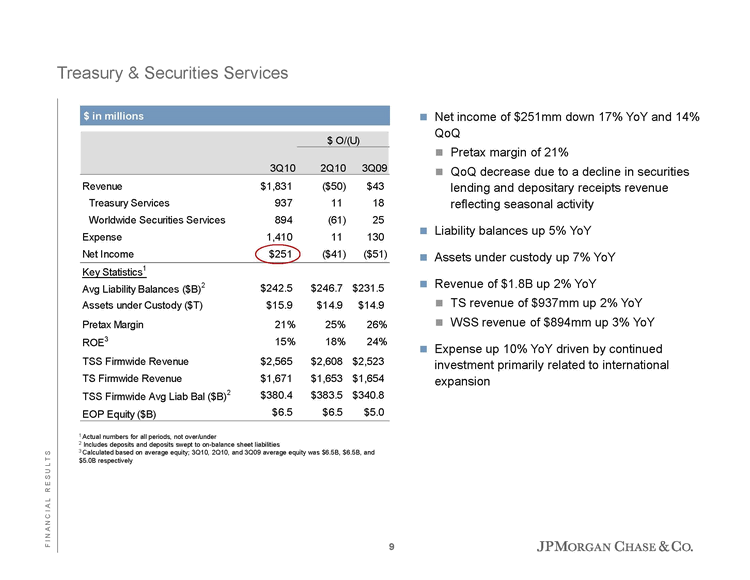
| Treasury & Securities Services $ in millions $ O/(U) 3Q10 2Q10 3Q09 Revenue $1,831 ($50) $43 Treasury Services 937 11 18 Worldwide Securities Services 894 (61) 25 Expense 1,410 11 130 Net Income $251 ($41) ($51) Key Statistics1 Avg Liability Balances ($B)2 $242.5 $246.7 $231.5 Assets under Custody ($T) $15.9 $14.9 $14.9 Pretax Margin 21% 25% 26% 3 15% 18% 24% ROE TSS Firmwide Revenue $2,565 $2,608 $2,523 TS Firmwide Revenue $1,671 $1,653 $1,654 2 $380.4 $383.5 $340.8 TSS Firmwide Avg Liab Bal ($B) EOP Equity ($B) $6.5 $6.5 $5.0 1 Actual numbers for all periods, not over/under 2 Includes deposits and deposits swept to on-balance sheet liabilities S 3 Calculated based on average equity; 3Q10, 2Q10, and 3Q09 average equity was $6.5B, $6.5B, and T $5.0B respectively L U S E R L A I C N A N I 9 F Net income of $251mm down 17% YoY and 14% QoQ Pretax margin of 21% QoQ decrease due to a decline in securities lending and depositary receipts revenue reflecting seasonal activity Liability balances up 5% YoY Assets under custody up 7% YoY Revenue of $1.8B up 2% YoY TS revenue of $937mm up 2% YoY WSS revenue of $894mm up 3% YoY Expense up 10% YoY driven by continued investment primarily related to international expansion |
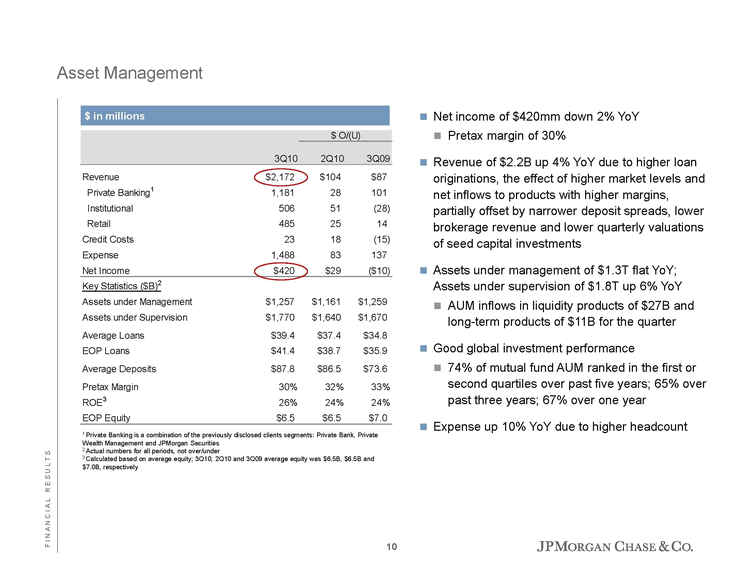
| Asset Management $ in millions $ O/(U) 3Q10 2Q10 3Q09 Revenue $2,172 $104 $87 Private Banking1 1,181 28 101 Institutional 506 51 (28) Retail 485 25 14 Credit Costs 23 18 (15) Expense 1,488 83 137 Net Income $420 $29 ($10) Key Statistics ($B)2 Assets under Management $1,257 $1,161 $1,259 Assets under Supervision $1,770 $1,640 $1,670 Average Loans $39.4 $37.4 $34.8 EOP Loans $41.4 $38.7 $35.9 Average Deposits $87.8 $86.5 $73.6 Pretax Margin 30% 32% 33% ROE3 26% 24% 24% EOP Equity $6.5 $6.5 $7.0 1 Private Banking is a combination of the previously disclosed clients segments: Private Bank, Private Wealth Management and JPMorgan Securities S 2 Actual numbers for all periods, not over/under T 3 Calculated based on average equity; 3Q10, 2Q10 and 3Q09 average equity was $6.5B, $6.5B and L $7.0B, respectively U S E R L A I C N A N I 10 F Net income of $420mm down 2% YoY Pretax margin of 30% Revenue of $2.2B up 4% YoY due to higher loan originations, the effect of higher market levels and net inflows to products with higher margins, partially offset by narrower deposit spreads, lower brokerage revenue and lower quarterly valuations of seed capital investments Assets under management of $1.3T flat YoY; Assets under supervision of $1.8T up 6% YoY AUM inflows in liquidity products of $27B and long-term products of $11B for the quarter Good global investment performance 74% of mutual fund AUM ranked in the first or second quartiles over past five years; 65% over past three years; 67% over one year Expense up 10% YoY due to higher headcount |
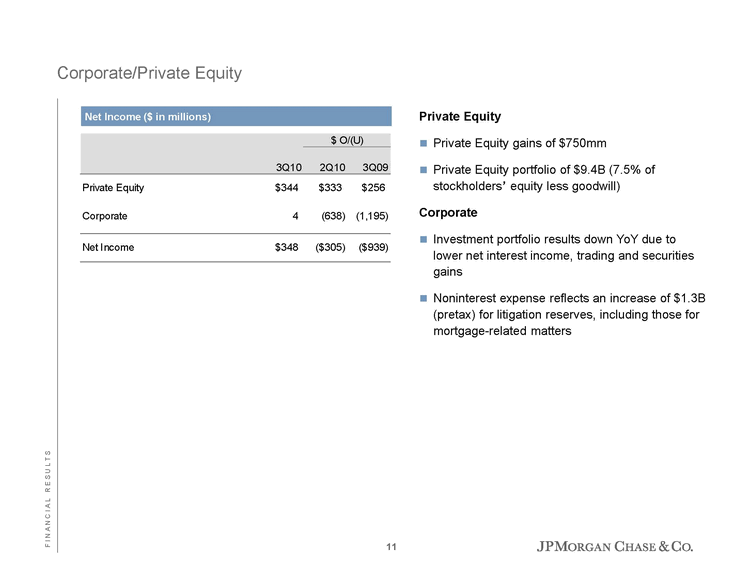
| Corporate/Private Equity R E S U L T S F I N A N C I A L Net Income ($ in millions) $ O/(U) 3Q10 2Q10 3Q09 Private Equity $344 $333 $256 Corporate 4 (638) (1,195) Net Income $348 ($305) ($939) 11 Private Equity Private Equity gains of $750mm Private Equity portfolio of $9.4B (7.5% of stockholders’ equity less goodwill) Corporate Investment portfolio results down YoY due to lower net interest income, trading and securities gains Noninterest expense reflects an increase of $1.3B (pretax) for litigation reserves, including those for mortgage-related matters |
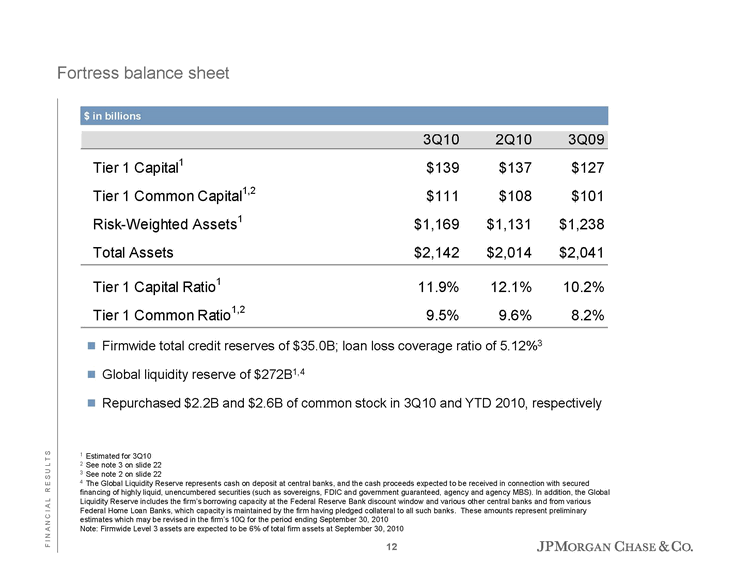
| Fortress balance sheet R E S U L T S F I N A N C I A L 3Q10 2Q10 3Q09 Tier 1 Capital1 $139 $137 $127 Tier 1 Common Capital1,2 $111 $108 $101 Risk-Weighted Assets1 $1,169 $1,131 $1,238 Total Assets $2,142 $2,014 $2,041 Tier 1 Capital Ratio1 11.9% 12.1% 10.2% Tier 1 Common Ratio1,2 9.5% 9.6% 8.2% Firmwide total credit reserves of $35.0B; loan loss coverage ratio of 5.12%3 Global liquidity reserve of $272B1,4 Repurchased $2.2B and $2.6B of common stock in 3Q10 and YTD 2010, respectively 1 Estimated for 3Q10 2 See note 3 on slide 22 3 See note 2 on slide 22 4 The Global Liquidity Reserve represents cash on deposit at central banks, and the cash proceeds expected to be received in connection with secured financing of highly liquid, unencumbered securities (such as sovereigns, FDIC and government guaranteed, agency and agency MBS). In addition, the Global Liquidity Reserve includes the firm’s borrowing capacity at the Federal Reserve Bank discount window and various other central banks and from various Federal Home Loan Banks, which capacity is maintained by the firm having pledged collateral to all such banks. These amounts represent preliminary estimates which may be revised in the firm’s 10Q for the period ending September 30, 2010 Note: Firmwide Level 3 assets are expected to be 6% of total firm assets at September 30, 2010 12 |
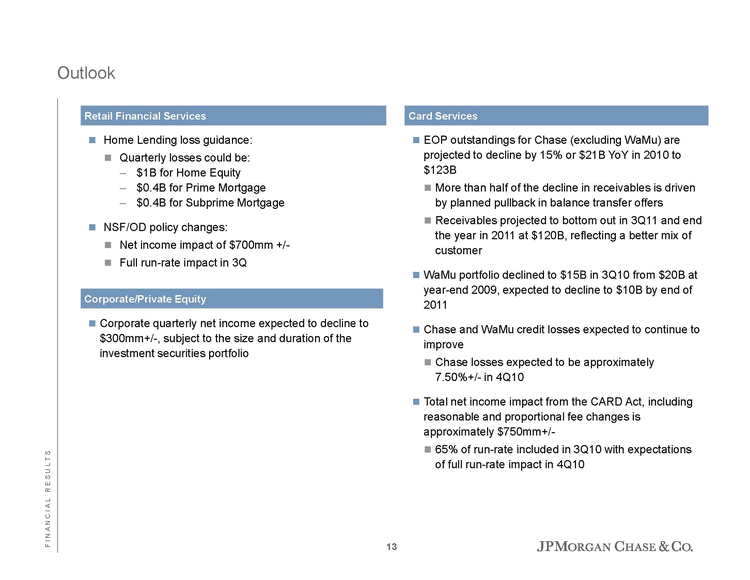
| Outlook R E S U L T S F I N A N C I A L Retail Financial Services Home Lending loss guidance: Quarterly losses could be: — $1B for Home Equity — $0.4B for Prime Mortgage — $0.4B for Subprime Mortgage NSF/OD policy changes: Net income impact of $700mm +/- Full run-rate impact in 3Q Corporate/Private Equity Corporate quarterly net income expected to decline to $300mm+/-, subject to the size and duration of the investment securities portfolio Card Services EOP outstandings for Chase (excluding WaMu) are projected to decline by 15% or $21B YoY in 2010 to $123B More than half of the decline in receivables is driven by planned pullback in balance transfer offers Receivables projected to bottom out in 3Q11 and end the year in 2011 at $120B, reflecting a better mix of customer WaMu portfolio declined to $15B in 3Q10 from $20B at year-end 2009, expected to decline to $10B by end of 2011 Chase and WaMu credit losses expected to continue to improve Chase losses expected to be approximately 7.50%+/- in 4Q10 Total net income impact from the CARD Act, including reasonable and proportional fee changes is approximately $750mm+/- 65% of run-rate included in 3Q10 with expectations of full run-rate impact in 4Q10 13 |
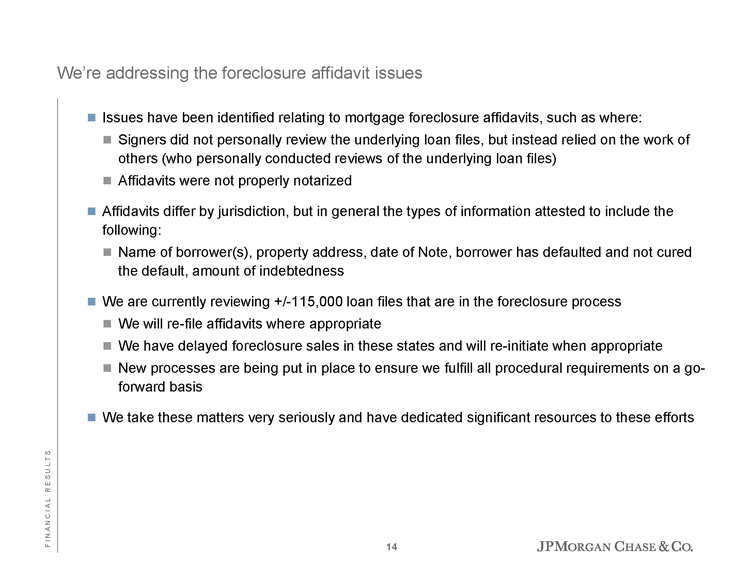
| We’re addressing the foreclosure affidavit issues R E S U L T S F I N A N C I A L Issues have been identified relating to mortgage foreclosure affidavits, such as where: Signers did not personally review the underlying loan files, but instead relied on the work of others (who personally conducted reviews of the underlying loan files) Affidavits were not properly notarized Affidavits differ by jurisdiction, but in general the types of information attested to include the following: Name of borrower(s), property address, date of Note, borrower has defaulted and not cured the default, amount of indebtedness We are currently reviewing +/-115,000 loan files that are in the foreclosure process We will re-file affidavits where appropriate We have delayed foreclosure sales in these states and will re-initiate when appropriate New processes are being put in place to ensure we fulfill all procedural requirements on a go-forward basis We take these matters very seriously and have dedicated significant resources to these efforts 14 |
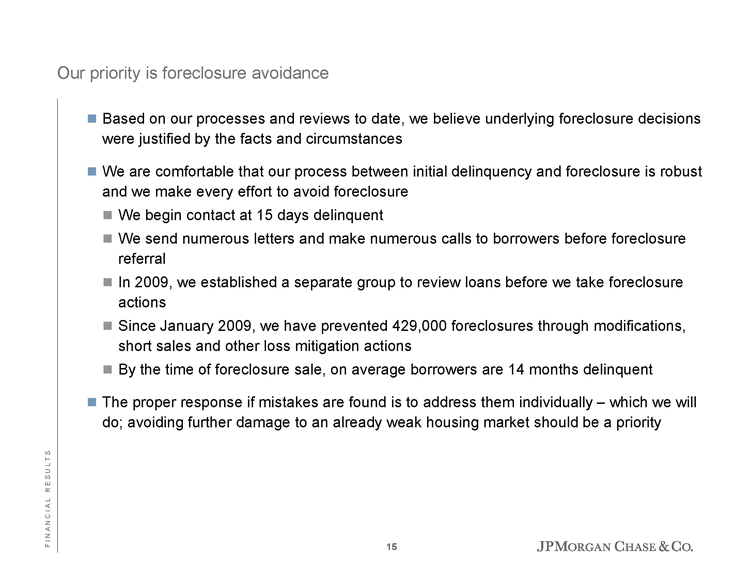
| Our priority is foreclosure avoidance R E S U L T S F I N A N C I A L Based on our processes and reviews to date, we believe underlying foreclosure decisions were justified by the facts and circumstances We are comfortable that our process between initial delinquency and foreclosure is robust and we make every effort to avoid foreclosure We begin contact at 15 days delinquent We send numerous letters and make numerous calls to borrowers before foreclosure referral In 2009, we established a separate group to review loans before we take foreclosure actions Since January 2009, we have prevented 429,000 foreclosures through modifications, short sales and other loss mitigation actions By the time of foreclosure sale, on average borrowers are 14 months delinquent The proper response if mistakes are found is to address them individually — which we will do; avoiding further damage to an already weak housing market should be a priority 15 |
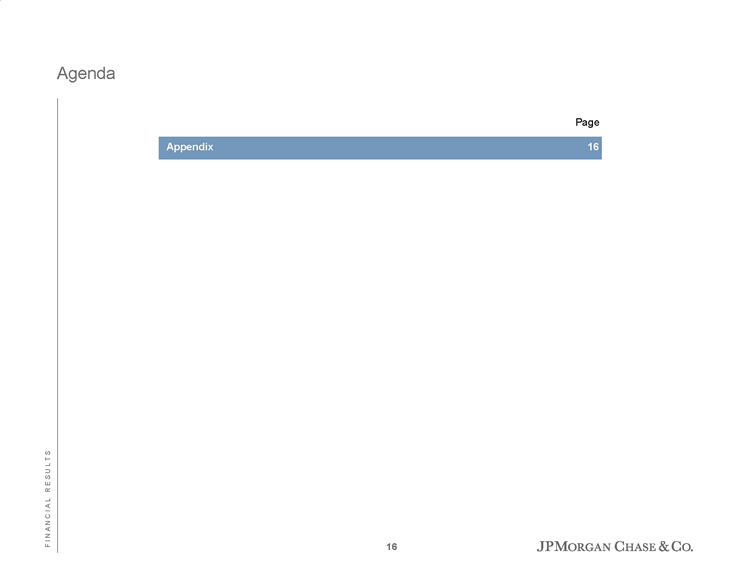
| Agenda Page Appendix 16 R E S U L T S F I N A N C I A L 16 |
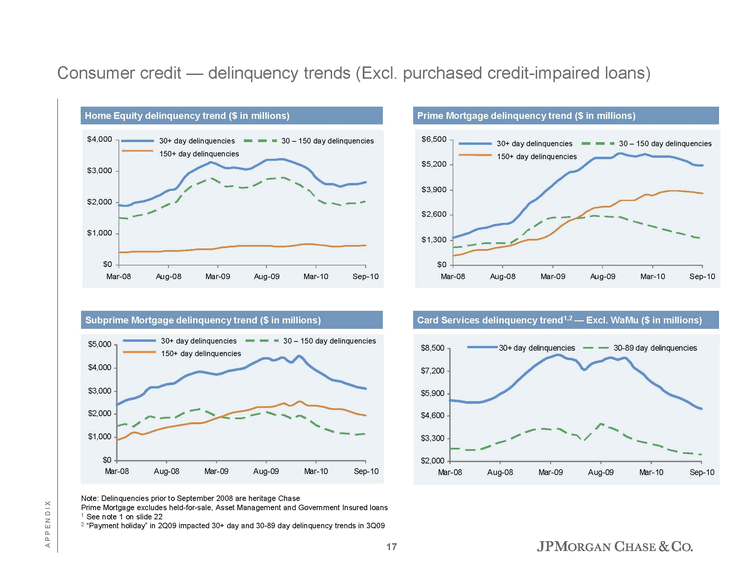
| Consumer credit — delinquency trends (Excl. purchased credi t-impaired loans) Home Equity delinquency trend ($ in millions) $4,000 30+ day delinquencies 30 — 150 day delinquencies 150+ day delinquencies $3,000 $2,000 $1,000 $0 Mar-08 Aug-08 Mar-09 Aug-09 Mar-10 Sep-10 Prime Mortgage delinquency trend ($ in millions) $6,500 30+ day delinquencies 30 — 150 day delinquencies $5,200 150+ day delinquencies $3,900 $2,600 $1,300 $0 Mar-08 Aug-08 Mar-09 Aug-09 Mar-10 Sep-10 P P E N D I X Subprime Mortgage delinquency trend ($ in millions) $5,000 30+ day delinquencies 30 — 150 day delinquencies 150+ day delinquencies $4,000 $3,000 $2,000 $1,000 $0 Mar-08 Aug-08 Mar-09 Aug-09 Mar-10 Sep-10 Note: Delinquencies prior to September 2008 are heritage Chase Prime Mortgage excludes held-for-sale, Asset Management and Government Insured loans 1 See note 1 on slide 22 2 “Payment holiday” in 2Q09 impacted 30+ day and 30-89 day delinquency trends in 3Q09 Card Services delinquency trend1,2 — Excl. WaMu ($ in millions) $8,500 30+ day delinquencies 30-89 day delinquencies $7,200 $5,900 $4,600 $3,300 $2,000 Mar-08 Aug-08 Mar-09 Aug-09 Mar-10 Sep-10 A 17 |
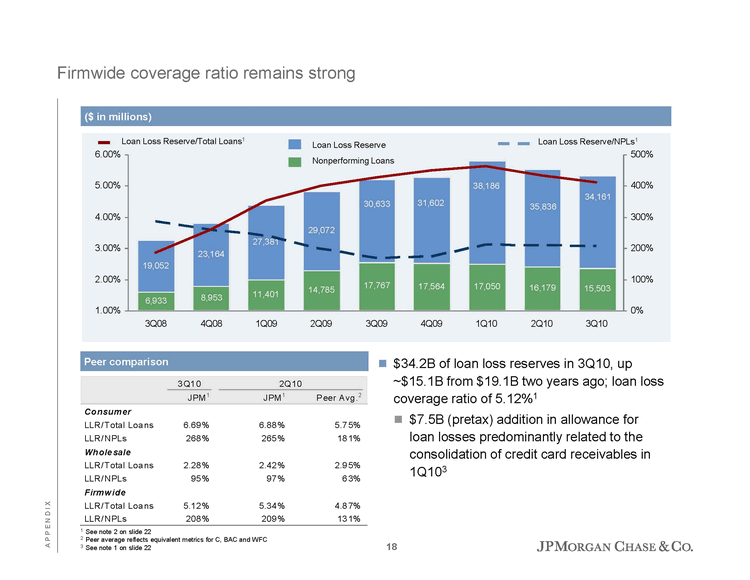
| Firmwide coverage ratio remains strong ($ in millions) Loan Loss Reserve/Total Loans1 Loan Loss Reserve Loan Loss Reserve/NPLs1 6.00% Nonperforming Loans 500% 5.00% 38,186 400% 30,633 31,602 34,161 35,836 4.00% 300% 29,072 3.00% 27,381 200% 23,164 19,052 2.00% 17,767 17,564 17,050 16,179 100% 11,401 14,785 15,503 8,953 6,933 1.00% 0% 3Q08 4Q08 1Q09 2Q09 3Q09 4Q09 1Q10 2Q10 3Q10 A P P E N D I X Peer comparison 3 Q1 0 2Q10 JPM1 JPM1 Peer A vg .2 Consumer LLR/Total Loa ns 6.69% 6.88% 5.7 5% LLR/NPLs 268% 265% 18 1% Whole sale LLR/Total Loa ns 2.28% 2.42% 2.9 5% LLR/NPLs 95% 97% 6 3% Firmwide LLR/Total Loa ns 5.12% 5.34% 4.8 7% LLR/NPLs 208% 209% 13 1% 1 See note 2 on slide 22 2 Peer average reflects equivalent metrics for C, BAC and WFC 3 See note 1 on slide 22 $34.2B of loan loss reserves in 3Q10, up ~$15.1B from $19.1B two years ago; loan loss coverage ratio of 5.12%1 $7.5B (pretax) addition in allowance for loan losses predominantly related to the consolidation of credit card receivables in 1Q103 18 |
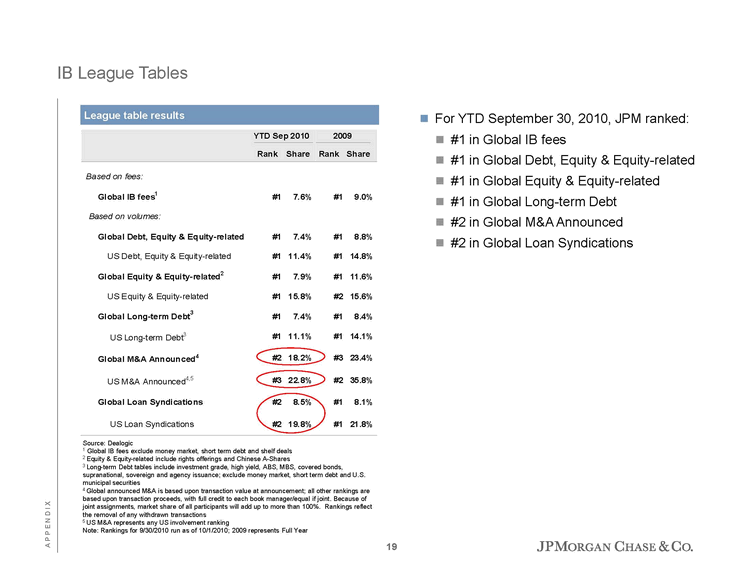
| IB League Tables League table results YTD Sep 2010 2009 Rank Share Rank Share Based on fees: Global IB fees1 #1 7.6% #1 9.0% Based on volumes: Global Debt, Equity & Equity-related #1 7.4% #1 8.8% US Debt, Equity & Equity-related #1 11.4% #1 14.8% Global Equity & Equity-related2 #1 7.9% #1 11.6% US Equity & Equity-related #1 15.8% #2 15.6% Global Long-term Debt3 #1 7.4% #1 8.4% 3 #1 11.1% #1 14.1% US Long-term Debt 4 #2 18.2% #3 23.4% Global M&A Announced 4,5 #3 22.8% #2 35.8% US M&A Announced Global Loan Syndications #2 8.5% #1 8.1% US Loan Syndications #2 19.8% #1 21.8% Source: Dealogic 1 Global IB fees exclude money market, short term debt and shelf deals 2 Equity & Equity-related include rights offerings and Chinese A-Shares 3 Long-term Debt tables include investment grade, high yield, ABS, MBS, covered bonds, supranational, sovereign and agency issuance; exclude money market, short term debt and U.S. municipal securities 4 Global announced M&A is based upon transaction value at announcement; all other rankings are X based upon transaction proceeds, with full credit to each book manager/equal if joint. Because of joint assignments, market share of all participants will add up to more than 100%. Rankings reflect I D the removal of any withdrawn transactions N 5 US M&A represents any US involvement ranking E Note: Rankings for 9/30/2010 run as of 10/1/2010; 2009 represents Full Year P P 19 A For YTD September 30, 2010, JPM ranked: #1 in Global IB fees #1 in Global Debt, Equity & Equity-related #1 in Global Equity & Equity-related #1 in Global Long-term Debt #2 in Global M&A Announced #2 in Global Loan Syndications |
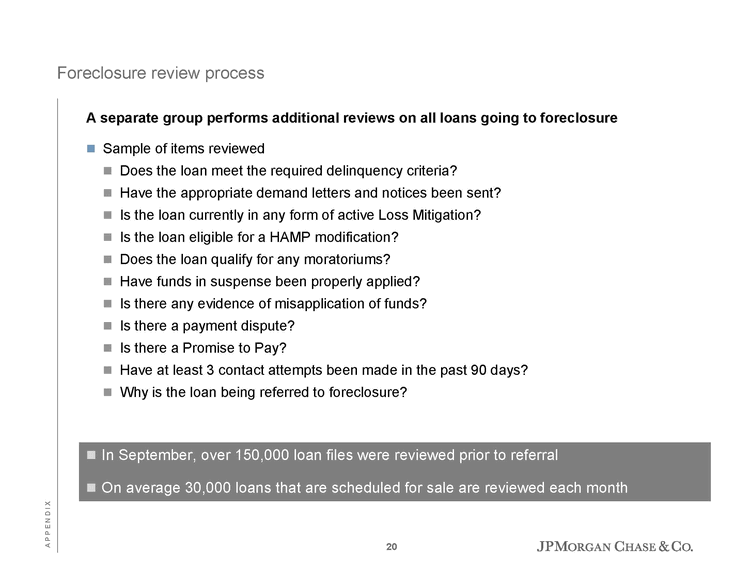
| Foreclosure review process A separate group performs additional reviews on all loans going to foreclosure Sample of items reviewed Does the loan meet the required delinquency criteria? Have the appropriate demand letters and notices been sent? Is the loan currently in any form of active Loss Mitigation? Is the loan eligible for a HAMP modification? Does the loan qualify for any moratoriums? Have funds in suspense been properly applied? Is there any evidence of misapplication of funds? Is there a payment dispute? Is there a Promise to Pay? Have at least 3 contact attempts been made in the past 90 days? Why is the loan being referred to foreclosure? In September, over 150,000 loan files were reviewed prior to referral On average 30,000 loans that are scheduled for sale are reviewed each month A P P E N D I X 20 |
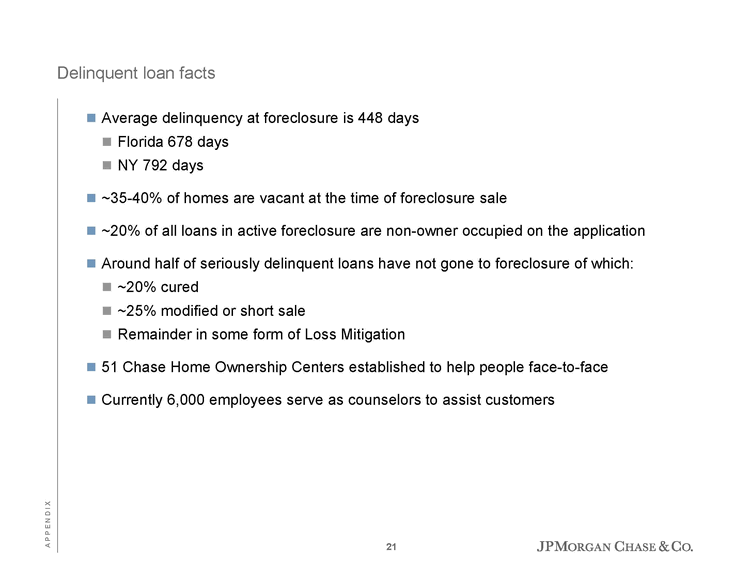
| Delinquent loan facts Average delinquency at foreclosure is 448 days Florida 678 days NY 792 days ~35-40% of homes are vacant at the time of foreclosure sale ~20% of all loans in active foreclosure are non-owner occupied on the application Around half of seriously delinquent loans have not gone to foreclosure of which: ~20% cured ~25% modified or short sale Remainder in some form of Loss Mitigation 51 Chase Home Ownership Centers established to help people face-to-face Currently 6,000 employees serve as counselors to assist customers A P P E N D I X 21 |
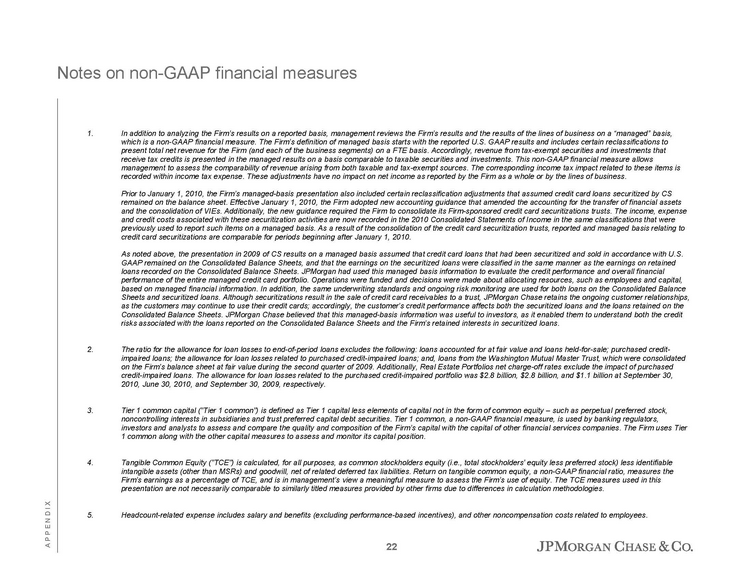
| Notes on non-GAAP financial measures A P P E N D I X 1. In addition to analyzing the Firm’s results on a reported basis, management reviews the Firm’s results and the results of the lines of business on a “managed” basis, which is a non-GAAP financial measure. The Firm’s definition of managed basis starts with the reported U.S. GAAP results and includes certain reclassifications to present total net revenue for the Firm (and each of the business segments) on a FTE basis. Accordingly, revenue from tax-exempt securities and investments that receive tax credits is presented in the managed results on a basis comparable to taxable securities and investments. This non-GAAP financial measure allows management to assess the comparability of revenue arising from both taxable and tax-exempt sources. The corresponding income tax impact related to these items is recorded within income tax expense. These adjustments have no impact on net income as reported by the Firm as a whole or by the lines of business. Prior to January 1, 2010, the Firm’s managed-basis presentation also included certain reclassification adjustments that assumed credit card loans securitized by CS remained on the balance sheet. Effective January 1, 2010, the Firm adopted new accounting guidance that amended the accounting for the transfer of financial assets and the consolidation of VIEs. Additionally, the new guidance required the Firm to consolidate its Firm-sponsored credit card securitizations trusts. The income, expense and credit costs associated with these securitization activities are now recorded in the 2010 Consolidated Statements of Income in the same classifications that were previously used to report such items on a managed basis. As a result of the consolidation of the credit card securitization trusts, reported and managed basis relating to credit card securitizations are comparable for periods beginning after January 1, 2010. As noted above, the presentation in 2009 of CS results on a managed basis assumed that credit card loans that had been securitized and sold in accordance with U.S. GAAP remained on the Consolidated Balance Sheets, and that the earnings on the securitized loans were classified in the same manner as the earnings on retained loans recorded on the Consolidated Balance Sheets. JPMorgan had used this managed basis information to evaluate the credit performance and overall financial performance of the entire managed credit card portfolio. Operations were funded and decisions were made about allocating resources, such as employees and capital, based on managed financial information. In addition, the same underwriting standards and ongoing risk monitoring are used for both loans on the Consolidated Balance Sheets and securitized loans. Although securitizations result in the sale of credit card receivables to a trust, JPMorgan Chase retains the ongoing customer relationships, as the customers may continue to use their credit cards; accordingly, the customer’s credit performance affects both the securitized loans and the loans retained on the Consolidated Balance Sheets. JPMorgan Chase believed that this managed-basis information was useful to investors, as it enabled them to understand both the credit risks associated with the loans reported on the Consolidated Balance Sheets and the Firm’s retained interests in securitized loans. 2. The ratio for the allowance for loan losses to end-of-period loans excludes the following: loans accounted for at fair value and loans held-for-sale; purchased credit-impaired loans; the allowance for loan losses related to purchased credit-impaired loans; and, loans from the Washington Mutual Master Trust, which were consolidated on the Firm’s balance sheet at fair value during the second quarter of 2009. Additionally, Real Estate Portfolios net charge-off rates exclude the impact of purchased credit-impaired loans. The allowance f or loan losses related to the purchased credit-impaired portfolio was $2.8 billion, $2.8 billion, and $1.1 billion at September 30, 2010, June 30, 2010, and September 30, 2009, respectively. 3. Tier 1 common capital (“Tier 1 common”) is defined as Tier 1 capital less elements of capital not in the form of common equity — such as perpetual prefe rred stock, noncontrolling interests in subsidiaries and trust preferred capital debt securities. Tier 1 common, a non-GAAP financial measure, is used by banking regulators, investors and analysts to assess and compare the quality and composition of the Firm’s capital with the capital of other financial services companies. The Firm uses Tier 1 common along with the other capital measures to assess and monitor its capital position. 4. Tangible Common Equity (“TCE”) is calculated, for all purposes, as common stockholders equity (i.e., total stockholders’ equity less preferred stock) less identifiable intangible assets (other than MSRs) and goodwill, net of related deferred tax liabilities. Return on tangible common equity, a non-GAAP financial ratio, measures the Firm’s earnings as a percentage of TCE, and is in management’s view a meaningful measure to assess the Firm’s use of equity. The TCE measures used in this presentation are not necessarily comparable to similarly titled measures provided by other firms due to differences in calculation methodologies. 5. Headcount-related expense includes salary and benefits (excluding performance-based incentives), and other noncompensation costs related to employees. 22 |
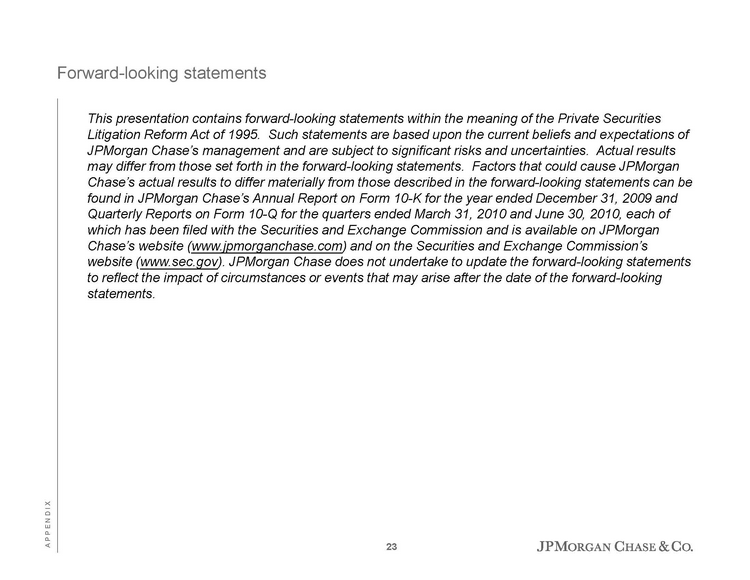
| Forward-looking statements This presentation contains forward-looking statements within the meaning of the Private Securities Litigation Reform Act of 1995. Such statements are based upon the current beliefs and expectations of JPMorgan Chase’s management and are subject to significant risks and uncertainties. Actual results may differ from those set forth in the forward-looking statements. Factors that could cause JPMorgan Chase’s actual results to differ materially from those described in the forward-looking statements can be found in JPMorgan Chase’s Annual Report on Form 10-K for the year ended December 31, 2009 and Quarterly Reports on Form 10-Q for the quarters ended March 31, 2010 and June 30, 2010, each of which has been filed with the Securities and Exchange Commission and is available on JPMorgan Chase’s website (www.jpmorganchase.com) and on the Securities and Exchange Commission’s website (www.sec.gov). JPMorgan Chase does not undertake to update the forward-looking statements to reflect the impact of circumstances or events that may arise after the date of the forward-looking statements. |
| A P P E N D I X |
| 23 |
